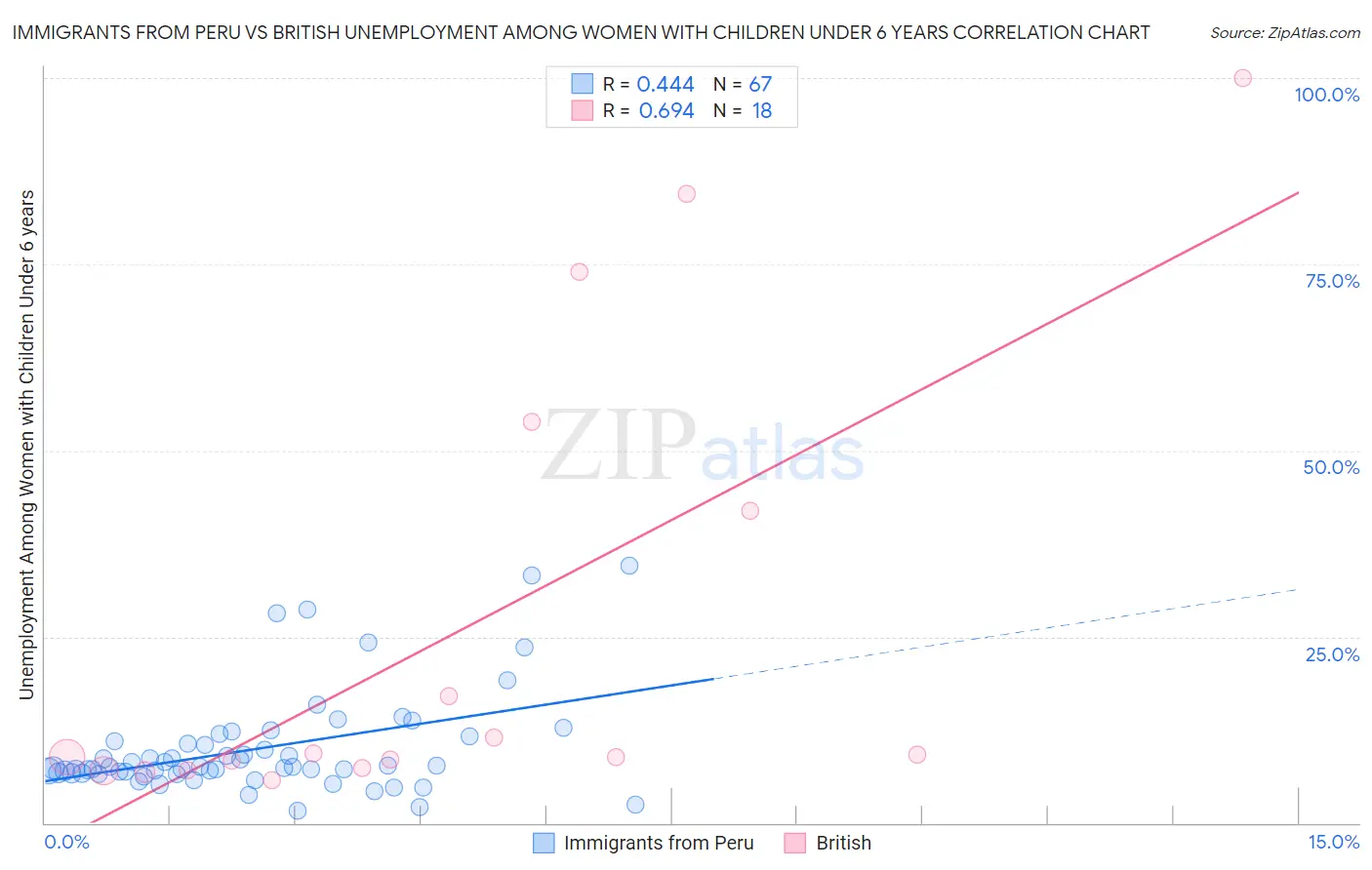Immigrants from Peru vs British Unemployment Among Women with Children Under 6 years
COMPARE
Immigrants from Peru
British
Unemployment Among Women with Children Under 6 years
Unemployment Among Women with Children Under 6 years Comparison
Immigrants from Peru
British
7.5%
UNEMPLOYMENT AMONG WOMEN WITH CHILDREN UNDER 6 YEARS
74.9/ 100
METRIC RATING
151st/ 347
METRIC RANK
7.6%
UNEMPLOYMENT AMONG WOMEN WITH CHILDREN UNDER 6 YEARS
66.3/ 100
METRIC RATING
163rd/ 347
METRIC RANK
Immigrants from Peru vs British Unemployment Among Women with Children Under 6 years Correlation Chart
The statistical analysis conducted on geographies consisting of 264,130,513 people shows a moderate positive correlation between the proportion of Immigrants from Peru and unemployment rate among women with children under the age of 6 in the United States with a correlation coefficient (R) of 0.444 and weighted average of 7.5%. Similarly, the statistical analysis conducted on geographies consisting of 362,468,252 people shows a significant positive correlation between the proportion of British and unemployment rate among women with children under the age of 6 in the United States with a correlation coefficient (R) of 0.694 and weighted average of 7.6%, a difference of 0.71%.

Unemployment Among Women with Children Under 6 years Correlation Summary
| Measurement | Immigrants from Peru | British |
| Minimum | 1.7% | 5.7% |
| Maximum | 34.5% | 100.0% |
| Range | 32.8% | 94.3% |
| Mean | 9.9% | 26.1% |
| Median | 7.5% | 9.0% |
| Interquartile 25% (IQ1) | 6.7% | 7.3% |
| Interquartile 75% (IQ3) | 11.0% | 41.9% |
| Interquartile Range (IQR) | 4.3% | 34.6% |
| Standard Deviation (Sample) | 6.8% | 30.8% |
| Standard Deviation (Population) | 6.7% | 29.9% |
Demographics Similar to Immigrants from Peru and British by Unemployment Among Women with Children Under 6 years
In terms of unemployment among women with children under 6 years, the demographic groups most similar to Immigrants from Peru are Bangladeshi (7.5%, a difference of 0.010%), Uruguayan (7.5%, a difference of 0.020%), Northern European (7.5%, a difference of 0.050%), South American (7.5%, a difference of 0.070%), and Aleut (7.5%, a difference of 0.10%). Similarly, the demographic groups most similar to British are Ugandan (7.6%, a difference of 0.040%), Immigrants from South America (7.6%, a difference of 0.050%), Immigrants from Lithuania (7.5%, a difference of 0.19%), Belgian (7.6%, a difference of 0.21%), and Kenyan (7.6%, a difference of 0.27%).
| Demographics | Rating | Rank | Unemployment Among Women with Children Under 6 years |
| Immigrants | Oceania | 78.4 /100 | #147 | Good 7.5% |
| Immigrants | Brazil | 77.3 /100 | #148 | Good 7.5% |
| Colombians | 76.1 /100 | #149 | Good 7.5% |
| Aleuts | 76.0 /100 | #150 | Good 7.5% |
| Immigrants | Peru | 74.9 /100 | #151 | Good 7.5% |
| Bangladeshis | 74.8 /100 | #152 | Good 7.5% |
| Uruguayans | 74.7 /100 | #153 | Good 7.5% |
| Northern Europeans | 74.3 /100 | #154 | Good 7.5% |
| South Americans | 74.1 /100 | #155 | Good 7.5% |
| Immigrants | Southern Europe | 73.2 /100 | #156 | Good 7.5% |
| Peruvians | 72.3 /100 | #157 | Good 7.5% |
| Croatians | 71.9 /100 | #158 | Good 7.5% |
| Immigrants | Philippines | 71.3 /100 | #159 | Good 7.5% |
| Bolivians | 70.8 /100 | #160 | Good 7.5% |
| Immigrants | Western Asia | 70.2 /100 | #161 | Good 7.5% |
| Immigrants | Lithuania | 68.8 /100 | #162 | Good 7.5% |
| British | 66.3 /100 | #163 | Good 7.6% |
| Ugandans | 65.8 /100 | #164 | Good 7.6% |
| Immigrants | South America | 65.6 /100 | #165 | Good 7.6% |
| Belgians | 63.5 /100 | #166 | Good 7.6% |
| Kenyans | 62.5 /100 | #167 | Good 7.6% |